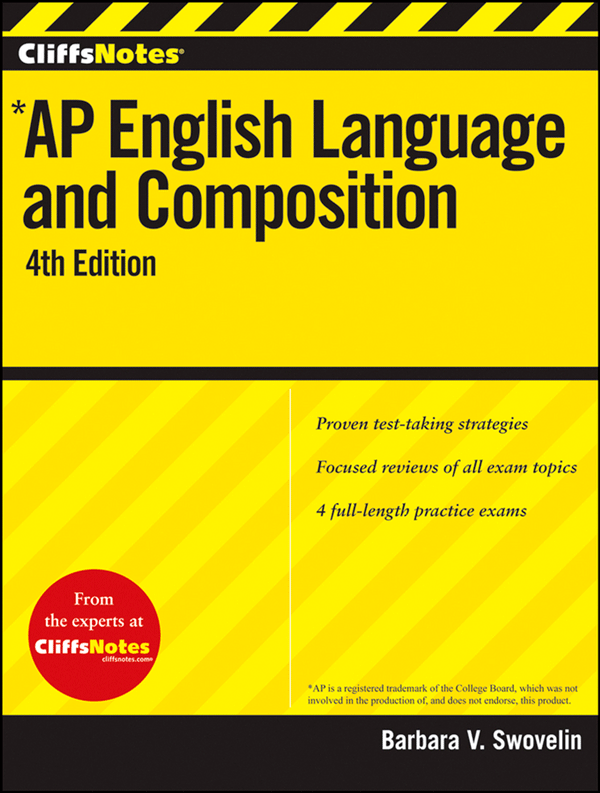Buy This CliffsNotes Book Here!
 The AP English Language and Composition Exam is used by colleges to assess your ability to perform college-level work. Actual college credit (either for one semester or for an entire year) may be offered by colleges and universities. The test lasts 3 hours and 15 minutes and consists of two major sections. The multiple-choice section includes approximately 55 questions that address four reading passages. All the questions in this section have equal value. The second portion of the test is called the free-response section. You are given three essay topics, and you must write an essay on each of the three topics in 2 hours and 15 minutes. The suggested time allotment for each essay is 40 minutes, and an extra 15 minutes is added for reading the essay prompts. Each of the essays is of equal value in your final score.
The AP English Language and Composition Exam is used by colleges to assess your ability to perform college-level work. Actual college credit (either for one semester or for an entire year) may be offered by colleges and universities. The test lasts 3 hours and 15 minutes and consists of two major sections. The multiple-choice section includes approximately 55 questions that address four reading passages. All the questions in this section have equal value. The second portion of the test is called the free-response section. You are given three essay topics, and you must write an essay on each of the three topics in 2 hours and 15 minutes. The suggested time allotment for each essay is 40 minutes, and an extra 15 minutes is added for reading the essay prompts. Each of the essays is of equal value in your final score.
The multiple-choice questions are designed to test your ability in analyzing prose passages. These passages are drawn from a variety of sources, rhetorical modes, historical or literary periods, and disciplines. You will be asked questions about the passages' style, content, and rhetoric. Expect four reading passages with between 12 and 15 questions per passage. However, do not be surprised if you receive five reading passages, which occasionally happens. If this is the case, the number of questions for each passage will be reduced accordingly. The multiple-choice questions are carefully written and screened by the AP Test Development Committee and the Educational Testing Service (ETS). The committee is ethnically and geographically balanced, and its members represent public and private high schools, as well as colleges and universities. The committee is responsible for choosing the passages for both the multiple-choice section and the essay portion of the exam. All of the multiple-choice questions are pretested in college classes before they are used on AP examinations.
The essays test your writing ability in a variety of modes and for a variety of purposes. These timed essays measure your expository and analytical writing skills, skills that are essential to success in many college exams. In general, expect that the three different essays will give you an opportunity to demonstrate that you can do the following:
-
Analyze how an author's rhetoric and style create meaning, based on one given reading passage.
-
Analyze an author's key point(s) in a given passage and create an argument essay that discusses the validity of the author's message.
-
Synthesize an argument of your own, based on multiple given passages, all dealing with similar subject matter.
The essay examinations are read and scored during a 7-day period in early June. In 2000, more than 300 readers representing the United States, Canada, and other foreign countries read more than 115,000 AP English Language exams; by 2005, more than 700 readers scored essays from 240,000 test-takers. More than half of the AP readers are college or university instructors; less than half are high school teachers. Each reader is assigned to score only one essay question during the reading session; therefore, each student's work is read by at least three different readers. Some essays are read and chosen as samples to be examined by all the readers, while others are checked by the table leaders and question leaders after an individual reader has scored the essay. You can trust that the essay scoring is as professional and accurate as possible. All readers are thoroughly trained and retrained throughout the week of scoring.
Each essay is scored on a scale from 0 to 9. After reading a large number of randomly selected essays, a committee creates a scoring guide that differentiates between the numerical scores for each of the three essay questions. Therefore, the scoring guide is based on the students' actual performance in writing the essays, not how the question writers anticipate they should perform.
Overall, the entire exam is designed to show student awareness of how an author creates meaning through language use, genre conventions, and rhetorical choices. A qualifying score demonstrates your ability to perform college-level work.